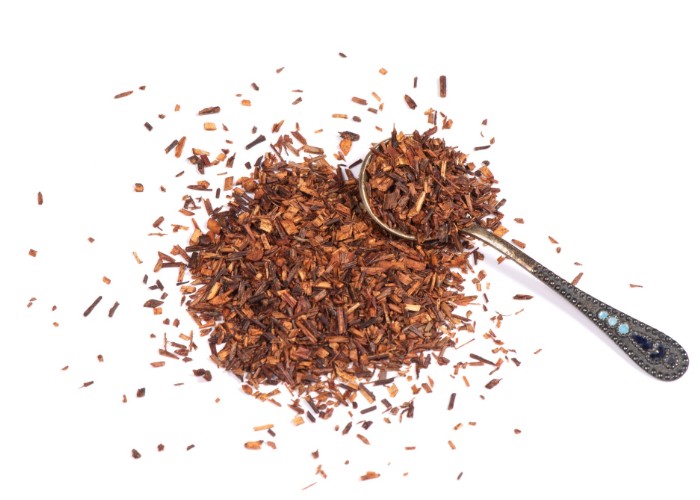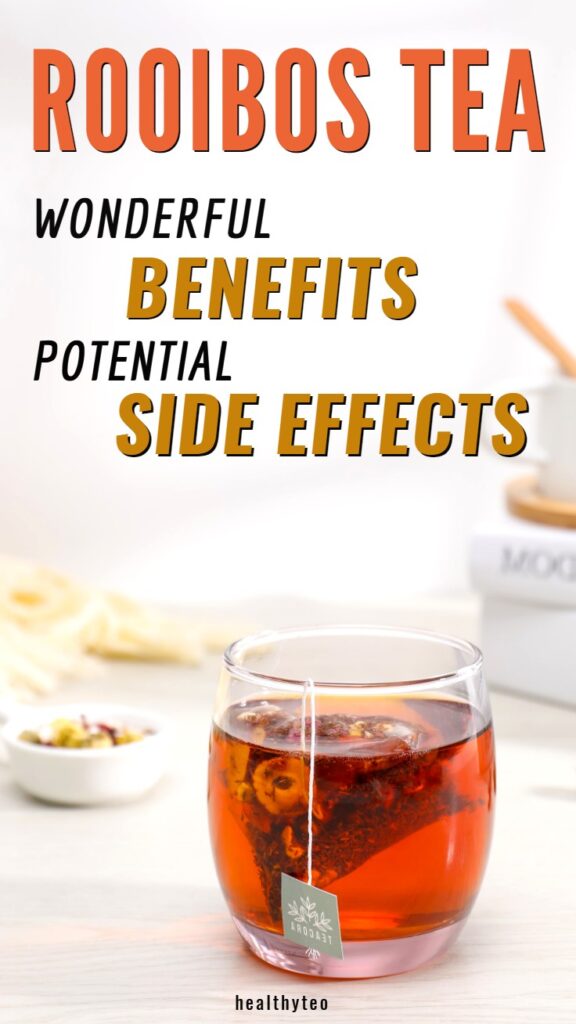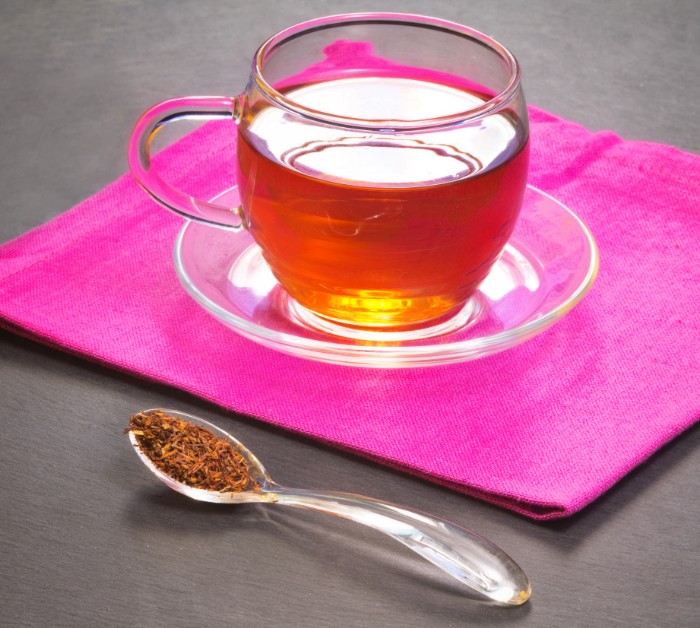Rooibos tea: a delicious red drink that boosts your health
This red beverage named Rooibos tea which in translation means “Red Bush”, is a naturally caffeine-free tea with a specific taste.
Unlike other teas like black, green, and white teas, rooibos doesn’t contain the leaves of the Camellia Sinensis plant. So even it is prepared as tea, technically it isn’t considered as tea.
More than just a caffeine-free delicious drink, every sip of rooibos tea delivers a long list of health benefits. When you see down here what are the benefits of rooibos tea and just a little or no side effects, you will want to drink a cup of this red tea right after reading this article.
This post may contain affiliate links, which means we may receive a small commission, at no cost to you, if you make a purchase through a link. For more information, please see our disclosure.
What is Rooibos Tea?
Rooibos tea (pronounced “ROY- boss”) comes from the shrub aspalathus linearis and strictly speaking isn’t a tea as it’s unrelated to the traditional tea plant Camellia sinensis.
Aspalathus linearis, the source of rooibos tea is a shrub or shrublet up to 2 m high, its brunches are often reddish. The leaves are green and needle-like, 15-60 mm long and up to about 1 mm thick. The fruit is a small lance-shaped pod usually containing one or two hard seeds.
This plant is cut by hand and then bruised to encourage oxidation which generates the flavor and rich color. As it oxidizes, rooibos becomes sweeter and redder.
Except for red rooibos, there is also a green rooibos tea, which is not fermented. It tends to be more expensive and grassier in flavor than the traditional version of the tea. This green version has double the number of antioxidants as the red rooibos.
How does rooibos tea taste?
It’s incredibly smooth and gentle with natural sweetness and a slightly nutty taste. It has lower levels of tannins which can give a normal tea a bitter taste.
Rooibos will never go bitter even if you leave the teabag in the cup it will remain sweetly smooth.
Consumed in Southern Africa for centuries, it has become a beloved drink around the world. Because it is caffeine-free now it is mostly used as a coffee alternative or caffeine-free alternative to green and black tea.
If you want to change your morning coffee with something healthier that gives you the same energy boost in the morning, read this article Best Tea Alternatives To Your Morning Coffee With and Without Caffeine.
Read on to find out more about the benefits and potential side effects of rooibos tea.

The benefits of Rooibos Tea
Rich in powerful antioxidants
Rooibos tea contains several antioxidants, most notably aspalathin, a flavonoid antioxidant particular to rooibos.
Antioxidants are important for human health because they stop free radicals from damaging cells in the body. There is some evidence that drinking rooibos tea can increase antioxidant levels in your body, but any increase documented has been small and doesn’t last long.
In a study from 2010 with the aim to assess the effect of drinking rooibos tea on total antioxidant capacity was found that the blood levels of antioxidants increased by 2.9% when participants drank red rooibos tea and 6.6% when they drank the green variety.
The uptick lasted for five hours after the participants drank 17 ounces (500ml) of tea made with 750 mg of rooibos leaves. This is possible because the antioxidants in rooibos are short-lived or inefficiently absorbed by your body.
As a summary of antioxidants, we can say that rooibos tea is full of them, however, these antioxidants may be unstable or inefficiently absorbed by your body.
Very low levels of tannins
Tannins are naturally occurring compounds present in many plant foods, including green tea, black tea, and red wine. They are bitter-tasting chemical structures that can interfere with iron absorption.
Iron is an important part or key to making red blood cells that carry oxygen around the body.
High levels of tannins in some teas like black tea account for the need to add sugar or milk to lessen the natural bitterness and astringency.
Opposite, the rooibos tea is smooth and sweet and can be drunk black as well as white.
A study from 20013 showed that drinking six cups of rooibos tea daily for six weeks did not negatively affect the participants’ iron status.
Rooibos and tannins
Compared to green or black tea, rooibos tea is lower in tannins and can be drunk black as well as white, no need for adding sugar or milk.
Naturally caffeine-free
We say naturally caffeine-free because, unlike black tea that must go under chemical processing to have caffeine removed, rooibos has absolutely no caffeine in its genetic make-up.
Therefore rooibos is a delicious alternative to black tea for those trying to reduce their caffeine intake.
While caffeine is a natural stimulant and may have some health benefits, not everyone can consume caffeine safely. It may cause physical effects like jitteriness and heart palpitations, it may interfere with sleep, and even worsen anxiety.
Find out more about caffeinated and caffeine-free teas that can replace your morning coffee.
Helps with weight loss
Naturally sweet and calorie-free, rooibos can be a great choice while trying to lose weight.
According to research from 2014 rooibos may help with weight loss by increasing levels of leptin. Leptin is a hormone released from fat cells located in adipose tissues, that send signals to the hypothalamus in the brain.
This hormone helps regulate food intake and sends signals to the body that it has enough food.
Also, aspalathin, highly present in rooibos, helps reduce stress hormones that trigger hunger and fat storage.
If you are on a diet and can’t lose weight, here is a reading for you that will surely help you: You Can’t Lose Weight? Here Is The Reason Why.
Fewer wrinkles
According to some studies if you apply rooibos tea topically it may improve the appearance of the skin by reducing wrinkles.
A study from 2010 compared herbal anti-wrinkle cosmetics formulated from Ginko, a mixture of tea and rooibos and soybean. These extracts were incorporated into the preliminary developed stable gel base with good preference.
The results from this study showed that the tea and rooibos mixture was most effective at reducing wrinkles, while Ginko was best for moisturizing skin.
However, it is unlikely that drinking rooibos tea will provide any notable skin benefits.
Soothing benefits
Rooibos tea is also known for its soothing properties. In South Africa for generations has been given to infants with colic as well as those with stomach cramps and other kinds of digestive issues.
These soothing properties have also made it useful for anxiety, asthma, allergies, and dermatological problems such as sunburn.
Hair benefits of rooibos tea
Boosts hair growth – Rooibos is enriched with minerals like copper, calcium, zinc, and potassium that not only promote hair growth while strengthening hair roots.
The benefits of rooibos tea go beyond drinking it. An independent laboratory tested a 10% rooibos tea extract on the scalps of volunteers experiencing hair loss. 78% of them saw an improvement and 45% of the volunteers saw hair growth.
Prevents gray hair – As a result of increased stress and pollution, the graying of hair is no longer a symptom of the aged. High levels of copper present in rooibos extract help prevent premature graying of hair.
Best tea substitute for people with kidney stones
The oxalic acid present in other types of teas, prevent people with kidney stones from consuming tea. The oxalic acid worsens the calcium or other kidney stones even further by enlarging them.
Rooibos tea doesn’t contain oxalic acid, so it doesn’t cause these kidney stones. So people with kidney stones can use rooibos tea as a perfect substitute.
Rooibos Tea potential side effects
According to most sources, rooibos is considered “likely safe” when consumed orally as a beverage. The negative side effects of consuming rooibos tea are extremely rare.
Risk of hepatoxicity – One source notes that drinking large amounts of rooibos tea daily may result in increased liver enzymes, which can often indicate liver problems. We must notice that this was only one complex case.
Estrogenic activity – Certain compounds in the tea can stimulate the production of the female sex hormone, estrogen. Some sources suggest that people with hormone-sensitive conditions, like breast cancer, may want to avoid this type of tea.
Fresh rooibos tea can be toxic – This is because fresh rooibos can be contaminated with salmonella or other bacteria – causing toxic reactions.
Pregnancy and breastfeeding – Not enough is known about the use of this red tea during pregnancy and breastfeeding. Stay on the safe side and avoid use.
Is Rooibos Tea Safe To Drink?
Rooibos tea is safe to drink. negative side effects are extremely rare. If you have any medical concerns triggered by tea or any other beverage be sure to consult a doctor before use.
How to prepare Rooibos Tea properly
Hot Rooibos Tea
Step #1. Boil Water
The best way to boil water for tea is by using an electric kettle with temperature control and set the water to 208 F for herbal tea. Boil extra water than what the tea calls for since you want more to warm up the teapot.
Tip: To make a good cup of tea you need to use good water. The better the water, the better the tea will taste so use filtered water.
Step #2. Warm Up Teapot
You should warm up the teapot with hot water and discard the water. We are doing these so so that when the rooibos steeps, the water temperature won’t drop drastically.
Step #3. Put the tea
Put the rooibos tea in the teapot and add hot water. We recommend you to try this Vanilla Rooibos Tea. This rooibos tisane brews a stunning reddish color and is perfect for any time of day.
Step #4. Steep for 5 minutes
Herbal teas do best when steeped for a minimum of 5 minutes. If you want a stronger brew increase the steep time for a couple of minutes.
Step #5. Pour the hot tea into a teacup
Strain rooibos solids with a mesh strainer, so there would be no solid rooibos parts in your tea.
And the final step, enjoy this delicious and healthy cup of rooibos tea!
Where to buy this red tea
Rooibos is often referred to as “red tea” and it is sold in the tea section of grocery and food stores.
Also, you can buy it online here as tea bags or try the organic rooibos leaf tea.
You can also spice up your tea routine and sip this full and savory blend of Rooibos Chai Tea. A completely caffeine-free alternative to the classic chai tea.
Questions that you may have
You can have rooibos tea with or without milk and sugar.
No, rooibos tea is completely caffeine-free. It is a great nighttime drink.
Since rooibos is oxidized, it is more shelf-stable than some other teas and herbs. It can stay drinkable and fresh for up to two years.
Because this tea comes from the rooibos plant and not from the Camellia Sinensis plant so it is not a real or true tea. The real tea is the tea that comes from the Camellia Sinensis plant like black, green, oolong, white, yellow, and Pu-erh tea. They all contain caffeine.
It tastes like mild tea with woody and earthy notes with a touch of honey.

Final thoughts about the rooibos tea benefits and side effects
This red tea is a great alternative if you want to slow down with caffeine drinks and drink something caffeine-free first thing in the morning.
Low in tannins, rich in antioxidants, easy to prepare is not just delicious it brings a long list of benefits for your health.
If you haven’t tried yet it is about time. We are sure that this tea will become one of your favorite drinks. And the best thing is that you can drink rooibos all year. You can consume it hot in the winter or as an ice-cold refreshing beverage in the summer.




